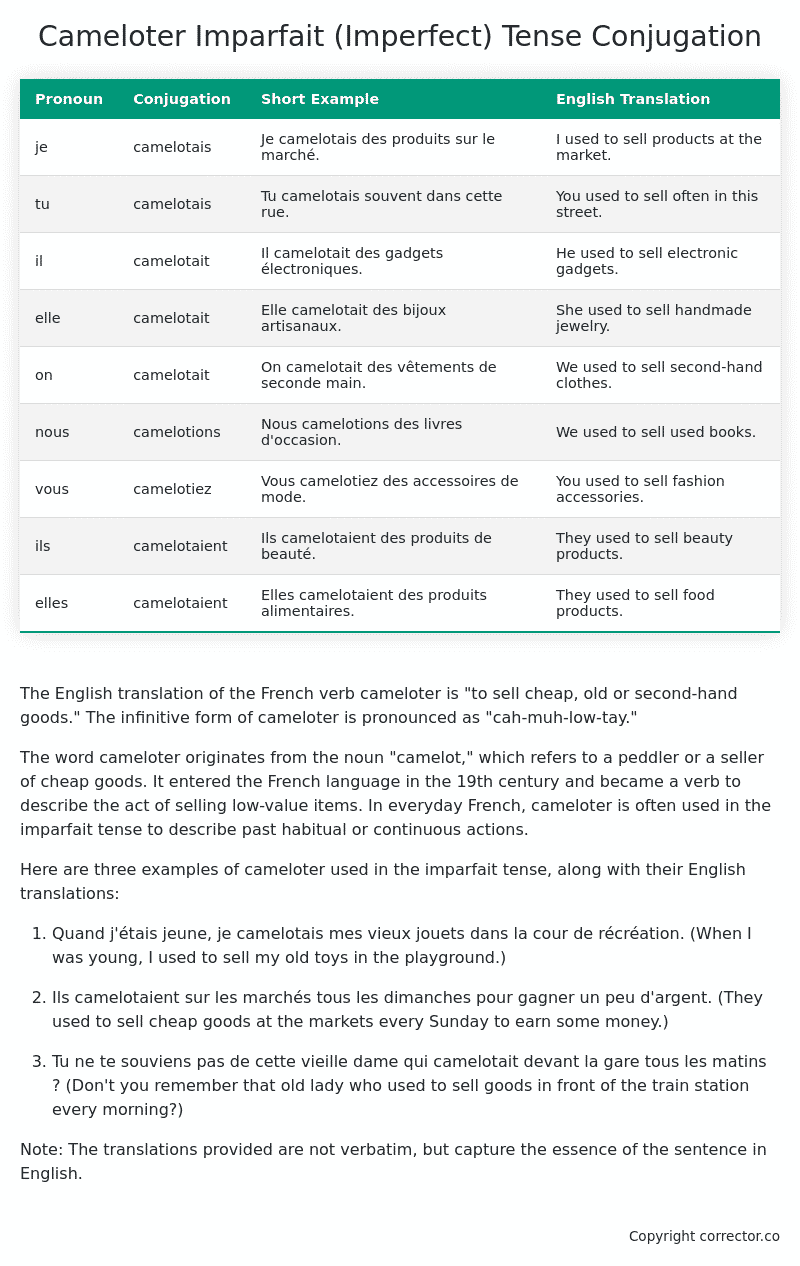Imparfait (Imperfect) Tense Conjugation of the French Verb cameloter
Introduction to the verb cameloter
The English translation of the French verb cameloter is “to sell cheap, old or second-hand goods.” The infinitive form of cameloter is pronounced as “cah-muh-low-tay.”
The word cameloter originates from the noun “camelot,” which refers to a peddler or a seller of cheap goods. It entered the French language in the 19th century and became a verb to describe the act of selling low-value items. In everyday French, cameloter is often used in the imparfait tense to describe past habitual or continuous actions.
Here are three examples of cameloter used in the imparfait tense, along with their English translations:
-
Quand j’étais jeune, je camelotais mes vieux jouets dans la cour de récréation.
(When I was young, I used to sell my old toys in the playground.) -
Ils camelotaient sur les marchés tous les dimanches pour gagner un peu d’argent.
(They used to sell cheap goods at the markets every Sunday to earn some money.) -
Tu ne te souviens pas de cette vieille dame qui camelotait devant la gare tous les matins ?
(Don’t you remember that old lady who used to sell goods in front of the train station every morning?)
Note: The translations provided are not verbatim, but capture the essence of the sentence in English.
Table of the Imparfait (Imperfect) Tense Conjugation of cameloter
| Pronoun | Conjugation | Short Example | English Translation |
|---|---|---|---|
| je | camelotais | Je camelotais des produits sur le marché. | I used to sell products at the market. |
| tu | camelotais | Tu camelotais souvent dans cette rue. | You used to sell often in this street. |
| il | camelotait | Il camelotait des gadgets électroniques. | He used to sell electronic gadgets. |
| elle | camelotait | Elle camelotait des bijoux artisanaux. | She used to sell handmade jewelry. |
| on | camelotait | On camelotait des vêtements de seconde main. | We used to sell second-hand clothes. |
| nous | camelotions | Nous camelotions des livres d’occasion. | We used to sell used books. |
| vous | camelotiez | Vous camelotiez des accessoires de mode. | You used to sell fashion accessories. |
| ils | camelotaient | Ils camelotaient des produits de beauté. | They used to sell beauty products. |
| elles | camelotaient | Elles camelotaient des produits alimentaires. | They used to sell food products. |
Other Conjugations for Cameloter.
Le Present (Present Tense) Conjugation of the French Verb cameloter
Imparfait (Imperfect) Tense Conjugation of the French Verb cameloter (You’re reading it right now!)
Passé Simple (Simple Past) Tense Conjugation of the French Verb cameloter
Passé Composé (Present Perfect) Tense Conjugation of the French Verb cameloter
Futur Simple (Simple Future) Tense Conjugation of the French Verb cameloter
Futur Proche (Near Future) Tense Conjugation of the French Verb cameloter
Plus-que-parfait (Pluperfect) Tense Conjugation of the French Verb cameloter
Passé Antérieur (Past Anterior) Tense Conjugation of the French Verb cameloter
Futur Antérieur (Future Anterior) Tense Conjugation of the French Verb cameloter
Subjonctif Présent (Subjunctive Present) Tense Conjugation of the French Verb cameloter
Subjonctif Passé (Subjunctive Past) Tense Conjugation of the French Verb cameloter
Subjonctif Imparfait (Subjunctive Imperfect) Tense Conjugation of the French Verb cameloter
Subjonctif Plus-que-parfait (Subjunctive Pluperfect) Tense Conjugation of the French Verb cameloter
Conditionnel Présent (Conditional Present) Tense Conjugation of the French Verb cameloter
Conditionnel Passé (Conditional Past) Tense Conjugation of the French Verb cameloter
Conditionnel Passé II (Conditional Past II) Tense Conjugation of the French Verb cameloter
L’impératif Présent (Imperative Present) Tense Conjugation of the French Verb cameloter
L’impératif Passé (Imperative Past) Tense Conjugation of the French Verb cameloter
L’infinitif Présent (Infinitive Present) Tense Conjugation of the French Verb cameloter
L’infinitif Passé (Infinitive Past) Tense Conjugation of the French Verb cameloter
Le Participe Présent (Present Participle) Tense Conjugation of the French Verb cameloter
Le Participe Passé (Past Participle) Tense Conjugation of the French Verb cameloter
Struggling with French verbs or the language in general? Why not use our free French Grammar Checker – no registration required!
Get a FREE Download Study Sheet of this Conjugation 🔥
Simply right click the image below, click “save image” and get your free reference for the cameloter imparfait tense conjugation!

Cameloter – About the French Imparfait Tense
NOTE: To take a deep dive into all the French tenses then see our article on Mastering French Tense Conjugation.
Formation of the Imparfait Tense
For regular -er verbs:
For regular -ir verbs
For regular -re verbs
Common Everyday Usage Patterns
Description of Past Habits
Background Information
Mental and Emotional States
It’s employed to express emotions, thoughts, or physical sensations in the past. For example: “J’étais content quand il est arrivé.” (I was happy when he arrived.)
Ongoing Actions
Points to Note About the Imparfait Tense
Passé Composé vs. Imparfait
Conditional
Si Clauses
Narration
I hope you enjoyed this article on the verb cameloter. Still in a learning mood? Check out another TOTALLY random French verb imparfait conjugation!


